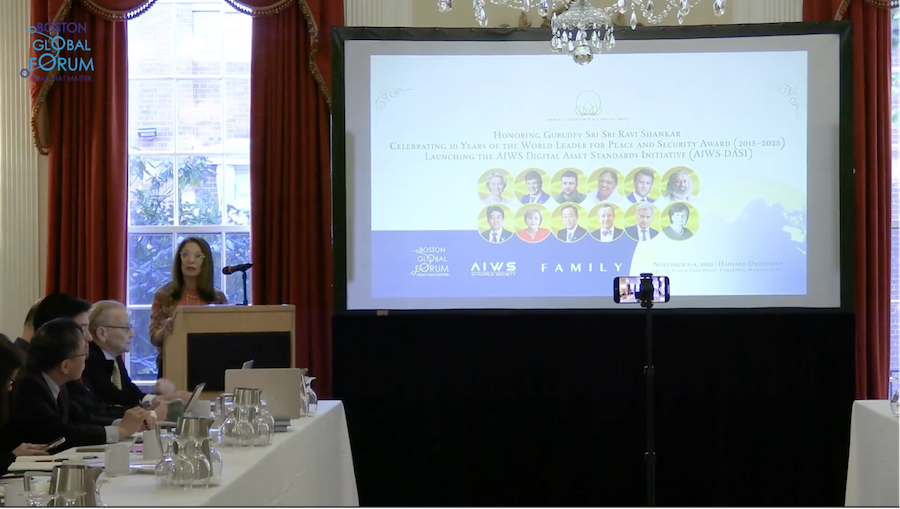Boston Global Forum Conference on AIWS Digital Asset Standard Initiative (AIWS-DASI)
Harvard University Loeb House — November 4, 2025
At the Boston Global Forum’s 2025 AIWS-DASI Conference, Professor Nazli Choucri of MIT delivered a compelling and intellectually rigorous address, outlining three enduring challenges that will shape the future of AI governance, digital security, and global political stability.
Her remarks provided a clear scholarly framework for the dilemmas facing governments, institutions, and societies as AI becomes increasingly embedded in daily life and global systems.
1. Two Sides of Governance: “AI for Governance” vs. “Governance of AI”
Professor Choucri opened by distinguishing two fundamentally different concepts:
AI for Governance
AI is already deeply woven into government operations, regulatory frameworks, administrative service delivery, and interactions between citizens and the state. This is progressing rapidly and, in many ways, effectively.
Governance of AI
This, she warned, is far more challenging.
While there is widespread agreement that AI requires guardrails, the how, what, and who remain contested:
- Tension between public and private sectors
- Differences in state vs. big-tech priorities
- Lack of shared frameworks for ethical, legal, and operational oversight
But the “elephant in the room,” she stressed, is cybersecurity.
Cybersecurity and AI — A Dangerous Asymmetry
While AI can improve cybersecurity, society has far less understanding of how cyber threats can compromise AI itself.
This reverse dependency — cyber vulnerabilities impacting AI — remains under-analyzed and under-addressed.
Professor Choucri emphasized that future AI governance must confront this asymmetry directly, as cyber threats will increasingly shape global power and national resilience.
2. The Human Element: Understanding Harms and Maliciousness
Her second major point addressed the role of human behavior in the risks associated with AI.
Drawing on recent MIT research on digital harms, Professor Choucri expressed surprise at one finding:
Human maliciousness, while real, is not the dominant force of harm
Instead, large-scale systemic harms increasingly arise from:
- Automated or algorithmic processes
- Computational amplification of risks
- System-generated representations of human behavior
The implication is profound:
AI systems themselves can propagate distortions, harms, or bias at a scale far beyond what any individual bad actor could achieve.
This raises essential questions for:
- Governance
- Accountability
- Insurance and liability
- Protection of fundamental values
- The future of digital public infrastructure
3. The Alignment Problem: Beyond Ethics to Intention
Professor Choucri’s third point focused on alignment — perhaps the most complex challenge in modern AI.
She noted:
- Ethics is important, but ethics alone is insufficient.
- The central issue is aligning AI systems with human intention.
To date, this gap remains the “soft spot” of AI development. Despite advances, society still struggles to ensure that AI reliably understands, respects, and executes human goals.
If alignment were achieved, Professor Choucri argued,
“a major dilemma would be lifted,” bringing AI closer to a trustworthy partner for governance, society, and global cooperation.
4. The Biggest Challenge Ahead: AI Geopolitics
Professor Choucri concluded with a political scientist’s long view:
“One of the greatest dilemmas now is AI geopolitics.”
Although she did not elaborate fully in this setting, she hinted that AI geopolitics will shape:
- Global power competition
- National strategy
- Cyber conflict
- Governance norms
- The stability or fragmentation of the international system
She noted that future discussions must explore how these geopolitical dynamics intersect with — or potentially undermine — the goals outlined earlier by Boston Global Forum and Nguyen Anh Tuan during the conference.
A Strategic, Thought-Provoking Contribution
Professor Choucri’s remarks offered the BGF–AIWS Family a critical intellectual roadmap for the years ahead.
Her analysis reinforced the urgency of:
- Strengthening AI governance structures
- Addressing cybersecurity dependencies
- Understanding human and systemic harms
- Advancing alignment research
- Recognizing the geopolitical stakes of AI development
Her talk stood as one of the conference’s most rigorous and forward-looking contributions, guiding the work of the AIWS Digital Asset Standards Initiative (AIWS-DASI) and the broader mission of ethical and human-centered AI development.

Please see Professor Choucri’s video here: